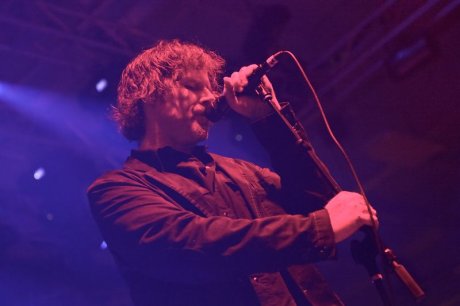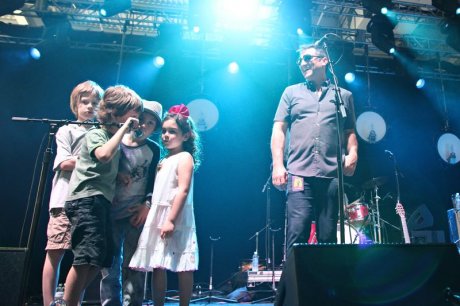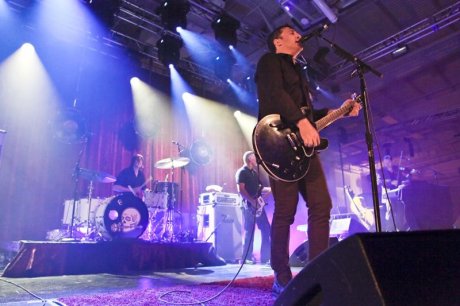Saturday: On Fully-, Partially-, and Barely-Absorbed Legends
Many considered Saturday to be the focal point of the festival because it was curated by Afghan Whigs/Twilight Singers/Gutter Twins frontman Greg Dulli and was basically a day-long celebration of the Whigs’ reunion and first tour in 13 years. A few of the day’s musicians have a history of collaborating with Dulli — who works strangely well in synthesis with others for such a singular personality — which led to both highlights and a degree of spottiness the ATP-curated portion didn’t have. By far the best thing about arriving in time for Italian has-beens Afterhours was simply seeing Dulli and frequent collaborator Mark Lanegan watching the set from only a few feet away. (“This is the best day of his [Dulli’s] life,” one stranger I was chatting with said. “He’s just walking around beaming.” And throughout the day it became clear that several of the former collaborators remain great pals, all of them walking freely among us.) As for the set, well, I’d given a quick listen to Afterhours’ moderately acclaimed career peak Hai Paura Del Buio a couple days before — it is a mediocre, occasionally neatly produced album that sounds of its time, but it didn’t prepare me for the gloriously awful, flat-out hair-metal homage I witnessed. This is as close as I’ll ever get to seeing Guns N’ Roses, or if that sounds too kind, christ, Twisted Sister or something. Singer Manuel Agnelli revealed the Dulli link by performing Twilight Singers’ “My Time (Has Come),” which was apparently cowritten by Agnelli and is something like the “Take Off Your Shirt” of 2006’s Powder Burns. I guess it was nice of Dulli to invite old friends from his, um, ‘wild years,’ and it’s not like the 12 p.m. slot was in anyone’s grill.

Mark Lanegan
On his records, Mark Lanegan often pokes a smirk at how elemental his rasp is — dude even looks like Tom Waits — by performing against a broad swathe of backdrops: drum machines, synths, glittery 1980s guitars, all of which sound bizarre at first, yet addicting in the long run. But besides some apparently undiagnosed technical difficulties that left the bass dubstep-nauseous (in order to make his bass-y voice more audible? I couldn’t piece it together, but suffice to say they don’t make earplugs for that shit), he played his pounding, late-night, cocaine-addled trucker vibes relatively straight. I dug when the sequin-kitsch of “Harborview Hospital” rose out of the murk, Lanegan’s poker-face brow knitted as ever, but I could’ve gone for a truck stop, a little more open space — a “Strange Religion” or “Morning Glory Wine,” perhaps. But at a festival that’s well-known for resuscitating past successes, it’s telling he was as glad as I was not to get into Screaming Trees territory.
Columbus’ Scrawl was a different story, a group that, for my money, needs wayyy more than their current footnote-status in the story of the 1990s: forget riot grrrl for a second (or, “foxcore, my ass” as they apparently put it) and focus on the churning bass of such glorious Albiniian buzz and twang; the smears of distortion (“Garden Path” vivisected); vocals that sear until your throat swells shut. I have to hand it to bassist Sue Harshe — having thought of Scrawl as mostly Marcy Mays’ group, I was surprised to see a healthy split between their stage personas. And for a group whose last album was recorded in 1998 but never, to my knowledge, actually disbanded (and for a group that deals with some corrosive shit: see, “I think I’m turning into a slut”), they seemed to be having the time of their lives up there. Maybe it makes some sense that they didn’t draw a single song from their bleak opus and probably best front-to-back collection of songs, Velvet Hammer, instead opting to close out with major-key crowdpleaser “Charles.” I guess “Blue Green Sea” or “Disappear Without a Trace” might’ve ruined what everyone knew was coming at the Whigs show. Which I’ll just give away the spoiler several paragraphs too early: “My Curse,” a song of the Whigs’ album Gentlemen that Mays guested on, kinda unfairly demolished all competition for best song of the evening.
But first, a few others under the motley banner of Dulli’s fine taste. TMT favorites Emeralds were the only band of their type that day. I thought they peaked with 2010’s Does It Look Like I’m Here because of their keen awareness of framing, but their uninterrupted set with a focus on brilliant, subtle transitions was more aligned with their earlier work. The first half-hour or so the duo was workmanlike, and it felt the way I imagined those Tangerine Dream sets Lester Bangs used to joke about might have: I kinda wished I didn’t already know they had such a thin slot, so I could’ve suitably zoned out. And they were at the outside stage, an absurdity that really could have been avoided. As if realizing the blazing sun partway through, they broke into a euphoric (‘hypnagogic,’ phah) stretch of volleyball music whose tubby bass and endless, reverb-drenched solos kinda overstayed its welcome.

Joseph Arthur
I was sure to check out Joseph Arthur, him being one of the only musicians of the weekend I neither knew nor felt that I should have known; I suppose I was getting the SXSW itch. Struggling to describe his sound, I found I could only call his music ‘singer-songwriter’ (a genre name I find particularly flaccid), and his set stood as a testament to the transferability of ‘singer-songwriter’-dom. The genre transfers easily between spheres of obscurity: without even intending any sourness here, I found myself thinking of cringers like Howie Day as often as of ‘authentic’ DIY-ers like Jeffery Lewis and nearly as often of fully absorbed legends like Dylan (although “Daddy’s On Prozac” was clearly a tribute to mostly absorbed legend Nirvana). ‘Singer-songwriter’ transfers across scale: I can’t say whether these songs were anthemic or intimate. Perhaps most promisingly for Arthur, ‘singer-songwriter’ transfers across musical identities, which is to say that Arthur benefited from not necessarily having one yet. For the faint aw-shucks absurdity of “Where Is My Van?” Dulli came on stage with a pack of toddlers to sing funky harmony (the kids’ spontaneous mistakes weaving in and out of time really worked). But Arthur got in the zone for “I Miss the Zoo,” a new track. At first I smelled gimmick (Arthur frantically painting on a canvas while spoke-sung words just poured out of him) but quietly, cumulatively, the song became moving: something about the breathlessness and the desire to use nostalgia as a vehicle to tap into the expansive vein of youth and drugs and addiction, and the summary — I miss the zoo — got to me. A friend compared its momentum to EMA’s “California,” which I hear, though Arthur’s final destination struck me as somehow, word count notwithstanding, simpler.
I have no sophisticated sonic analysis of Charles Bradley, the “original screaming eagle of soul” (wasn’t his debut just last year? Wasn’t he, indeed, a James Brown impersonator for awhile?) but I will say that witnessing that kind of explosive energy in person was riveting. His face contorted with emotion even as he expressed undying love and gratitude between songs (“thank you for rescuing me from being homeless; thank you” as pirates shifted uncomfortably); his lyrics discussed suffering almost apocalyptically. But even when he slung the mic stand over his shoulder to possibly represent the cross, he didn’t seem remotely contrived.
I’m one of those Antlers fans, caught in a position totally antithetical to critical parsing that I know I share with at least one or two other TMTers, only gradually coming to grips with the strength of Burst Apart because it isn’t Hospice. Interviews suggest that Silberman, glad to have documented the events of Hospice and with a sort of bemused pride that something personal hit so many people so hard, keeps the album at arm’s length nowadays. So I wasn’t too shocked that only one of the seven-song set — “Silvia,” which Silberman confessed they hadn’t played in more than a year — was from that era. And it was one of the weaker performances of an excellent set, somewhat ill-adapted to Antlers’ musical direction (the original song riding a tense line of distortion right into its climax, jumping right into fleshy berth and losing dynamic range for it) and especially Silberman’s penchant for falsetto. But holy hell did they create a breathing, unified entity otherwise: transitions between songs were masterful, the interstitial material of this year’s Undersea EP valuable, comparisons to early Sigur Rós ringing true for the first time. The way they swapped the jazzy organ in “Rolled Together” for a crashing wave of white noise bordered on religious. Anyone suspecting that this group’s trading of emotional heft for an emphasis on texture would be convinced by this performance of their indivisibility.

Afghan Whigs
If we take the sequencing seriously, the headliners for the day were The Roots, but that was a weirdly calculated taste-gauge on ATP’s part; Afghan Whigs’ set was so damned cathartic The Roots afterward felt like elevator music. Every element of a great show was in place, and Dulli’s technique of re-appropriating well-known tunes in his intros and outros felt both silly/spontaneous and carefully-orchestrated; occasionally, smashing the audience over the head with an Afghan Whigs song right when the chorus of, say, “Purple Rain” ought to come in made their songs sound even more twisted and noisy than they would have.
Then there’s Dulli himself, off of whom I really couldn’t take my eyes (despite realizing the real novelty was the presence of original members John Curley and the cagey Rick McCollum): I love the guy because I can’t get a handle on him. I have no idea, even briefly eyeballing the audience at this show, what type of person tends to be an Afghan Whigs fan, or what the group’s place in history might be, but I find myself inexplicably drawn to his (or his unending character’s) almost sociopathic combination of primal urge and dishonesty, bold yet clammy, libidinal yet brooding. The screaming and noise had a sort of majesty, but the best parts of the concert came when everything hushed, he grabbed the mic off the stand and had his chilling, reptilian moments with the audience. Best example was probably his terrific cover of Marie Queenie Lyons’ “See and Don’t See”: “If I ever, if I ever face reality/ I know that would be the end of me.” He seemed to make eye contact with every one of us.
The Whigs’ setlist was interesting. All Tomorrow’s Parties will forever be linked to the unending Don’t Look Back concert series, which, like the 33 1/3 book series, features some obvious classics and some retrofitting wedges. While none of the shows this weekend were technically part of the Don’t Look Back series, the Whigs sequenced their set in a way that hinted they might be interested in playing not 33 1/3 pick and list-dominator Gentlemen but its torrential 1996 followup Black Love. Gentlemen would be my pick too, but it is a bit of a depressant for such an exciting moment, and the Whigs made the Black Love glut work: I can’t fathom a better set opener for them than “Crime Scene, Part One,” and they closed out with the last three tracks from that same album, an almost excessively exhilarating suite that on the album clocks in at nearly 20 minutes. On the release of Twilight Singers’ Dynamite Steps last year, I argued Dulli was cleaned-up enough to present himself as the legend he might be, but I also worried he might not be capable of confronting his old Ohio demons should the Whigs reunite. The show felt like an officiation of Dulli’s ability to manage both at once. The evening belonged to him.
